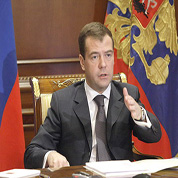Undaunted Kremlin announces more extreme measures against perennial corruption

President Medvedev — who has made the elimination of bribery and corruption, the two sister-evil crimes that have decimated government efforts and individual aspirations in all aspects of life in the country for ages one of his key signature policies — has recently found out how really recalcitrant and deep-seated these practices are among corrupt bureaucrats in all levels of local, municipal, regional and federal governments in the country.
This marked endemism of corruption in Russia has frustrated all previous efforts to rein in this vice that has eaten far deep into all fibers of modern society. It has also frustrated the Kremlin, which is trying to sell Russia to the outside world as a new, post-crisis global financial center via diversification of the economy from its lopsided mono-product dependence on its vast energy resources and modernization policy. Consequently, it was forced to take new measures against corruption and those indulging in it in February, when it drew up a bill that increases fines for bribery by up to 100 times the size of the graft demanded and/or accepted. The new maximum fine for corrupt practices is to be set at 500mln rubles, which sharply contrasts with the current highest punitive benchmark of some paltry thousands rubles.
The new and more drastic measures were necessitated by the failure so far of the previously adopted measures, including those taken within the frameworks of the National Plans against Corruption, to produce positive results from the ongoing war on corruption, which investors have called the biggest impediment to undertaking any meaningful business ventures in Russia, as this ‘social evil’ significantly increases the ‘real cost’ of entrepreneurship and living in the country.
The lack of the expected successes from the previous measures, which mainly include increments in jail terms, stems from the fact that most corrupt officials prefer to go to jail if convicted of taking bribes to stopping the evil practices that bring them multi-million revenues per year. This mentality stems from the fact that the current punishments for bribery are too lenient to serve as a serious deterrent to those extracting bribes from businesses, parents seeking admissions for their kids into educational institutions, drivers who break traffic rules, patients seeking medical care, etc.
Besides, the Kremlin’s task is further complicated by the fact that most Russians have come to see bribe solicitations from bureaucrats as a social norm in every aspect of society, with the amounts of demanded grafts varying from one sphere to the other, depending on the bureaucrats’ greed level and significance of the services sought by citizens.
All these have prompted a geometric progression increase in bribery volume, rising from 200,000 cases in 2008 to 260,000 cases in 2009 and over 180,000 cases in the first nine months of 2010, according to the official data submitted in December 2010 by the General Prosecutor’s Office, which put total damage from bribery in 2010 alone at 12bln rubles. However, this figure is most conservative at best, as Russia’s National Anti-Corruption Committee and the World Bank have put their estimates at 50% and 48%, respectively.
Similarly, according to Vasily Piskarev, the head of the Central Directorate for Procedural Issues at the Russian Prosecutor’s General Office, the gross sum of all incomes earned annually by corrupt officials in the country totals about 33% of the country’s national budget, while the local anticorruption think tank, the Indem Foundation, says business executives annually spend about $33bln on payments of bribes to corrupt government officials in Russia every year. All these figures, in opinion of experts, are much closer to reality.
Since the abolition of confiscation of properties amassed via illegal or direct/veiled corrupt means in the 1990s and the rampant practices of registration of properties in the names of distant relatives by corrupt bureaucrats to avoid taxation and mask their real owners have also helped to ‘immunize’ corrupt officials to the ever-increasing stringency of new anti-corruption legislations. Besides, the old adage about the severity of ‘all Russian laws always being seriously diluted by their ineffective enforcement and downright sabotage by incompetent bureaucracy’ is still very much alive today, to the delight of corrupt officials.
Against the back ground of such a fertile soil for bribery rampancy through the country and all spheres of life, it is, therefore, not surprising that Transparency International traditionally ranks Russia among the world’s most corrupt nations, coming in at the 154th position out of a total of 178 countries ranked in the agency’s most recent rating. All spheres of society life – from government officials, doctors, traffic police, etc – are involved in this practice. It is not surprising that Kremlin Chief of Staff Sergei Naryshkin has called bribery and corruption a ‘highly contagious’ twin evils in the country.
Via this new strategy, the Kremlin strategists expect that the tactic of ‘calling in Beelzebub to cast out Satan,’ that is stamping a colossal financial fine against money-loving bribe extractors, will serve as a more potent punitive deterrent than jailing or merely confiscation of assets that are difficult to trace in the first place.
Specifically, the Russian president hopes the new, 100-fold increase in punitive fine against corrupt officials will surely put bribery convicts in dire financial conundrums, and then that the onus will be on them to sell their assets, including those hidden under fictitious identities in and outside the country, to offset such financial obligations to the state, if they are to avoid ensuing more devastating social ostracism and public disgrace for themselves and their family members.












 Web design,
Web design,